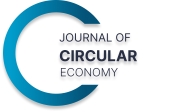The Social Importance of Researching Action-Oriented Circular Futures
Abstract
Although the circular economy (CE) aims to address ecological and social challenges of our times, a narrow focus on technical solutions risks perpetuating the structures that underpin today’s eco-social crisis. Achieving a fair and sustainable CE therefore requires approaches that go beyond business-as-usual and consider the deeper economic, social and political dimensions of circularity. In this regard, Techniques of Futuring (ToFs) are powerful tools for envisioning and co-creating alternative pathways. To date, much of circular futures research has relied on static, scenario-based planning that successfully identifies possible endpoints, but not how to navigate from the present to a transformative future. By systematically integrating ToFs such as backcasting, Delphi and SWOT analyses, researchers and practitioners can identify the necessary policy measures, technological innovations and cultural shifts to realise an equitable and ecologically sound CE. This action-oriented perspective is essential to overcome current limitations, guide societal change and ensure that the CE becomes a genuinely inclusive and sustainable paradigm.
DOI: https://doi.org/10.55845/OYKZ1486
References
Bauwens, T., Hekkert, M., & Kirchherr, J. (2020). Circular futures: What Will They Look Like? Ecological Economics, 175, 106703. https://doi.org/10.1016/j.ecolecon.2020.106703
Bradfield, R. M. (2008). Cognitive Barriers in the Scenario Development Process. Advances in Developing Human Resources, 10(2), 198-215. https://doi.org/10.1177/1523422307313320
Calisto Friant, M., Vermeulen, W. J. V., & Salomone, R. (2020). A typology of circular economy discourses: Navigating the diverse visions of a contested paradigm. Resources, Conservation and Recycling, 161, 104917. https://doi.org/10.1016/j.resconrec.2020.104917
Genovese, A., & Pansera, M. (2021). The Circular Economy at a Crossroads: Technocratic Eco-Modernism or Convivial Technology for Social Revolution? Capitalism Nature Socialism, 32(2), 95-113. https://doi.org/10.1080/10455752.2020.1763414
Hajer, M. A., & Pelzer, P. (2018). 2050—An Energetic Odyssey: Understanding ‘Techniques of Futuring’ in the transition towards renewable energy. Energy Research & Social Science, 44, 222-231. https://doi.org/10.1016/j.erss.2018.01.013
Kirchherr, J. (2022). Circular economy and growth: A critical review of “post-growth” circularity and a plea for a circular economy that grows. Resources, Conservation and Recycling, 179, 106033. https://doi.org/10.1016/j.resconrec.2021.106033
Lowe, B. H., & Genovese, A. (2022). What theories of value (could) underpin our circular futures? Ecological Economics, 195, 107382. https://doi.org/10.1016/j.ecolecon.2022.107382
Murray, A., Skene, K., & Haynes, K. (2017). The Circular Economy: An Interdisciplinary Exploration of the Concept and Application in a Global Context. Journal of Business Ethics, 140(3), Article 3. https://doi.org/10.1007/s10551-015-2693-2
Oomen, J., Hoffman, J., & Hajer, M. A. (2022). Techniques of futuring: On how imagined futures become socially performative. European Journal of Social Theory, 25(2), 252-270. https://doi.org/10.1177/1368431020988826
Pinyol Alberich, J., Pansera, M., & Hartley, S. (2023). Understanding the EU’s circular economy policies through futures of circularity. Journal of Cleaner Production, 385, 135723. https://doi.org/10.1016/j.jclepro.2022.135723.
How to Cite This Article
Suárez-Eiroa, B. (2025). The Social Importance of Researching Action-Oriented Circular Futures. Journal of Circular Economy, 3(1). https://doi.org/10.55845/OYKZ1486
Copyright
Open Access: This article is licensed under a Creative Commons Attribution 4.0 International License, which permits use, sharing, adaptation, distribution and reproduction in any medium or format, as long as you give appropriate credit to the original author(s) and the source, provide a link to the Creative Commons licence, and indicate if changes were made. The images or other third-party material in this article are included in the article’s Creative Commons licence, unless indicated otherwise in a credit line to the material. If material is not included in the article’s Creative Commons licence and your intended use is not permitted by statutory regulation or exceeds the permitted use, you will need to obtain permission directly from the copyright holder. To view a copy of this licence, visit http://creativecommons.org/licenses/by/4.0/.
Author Notes
Brais Suárez-Eiroa[1][2]*
- [1] Universidade de Vigo, Post-Growth Innovation Lab, 36001, Pontevedra, Spain
- [2] Centro de Investigação do território, transportes e ambiente, 4200-465 Porto, Portugal
- * Corresponding author: [email protected]
Published Details: Received: 15.11.2024 / Accepted: 08.03.2025 / Published: 21.03.2025
